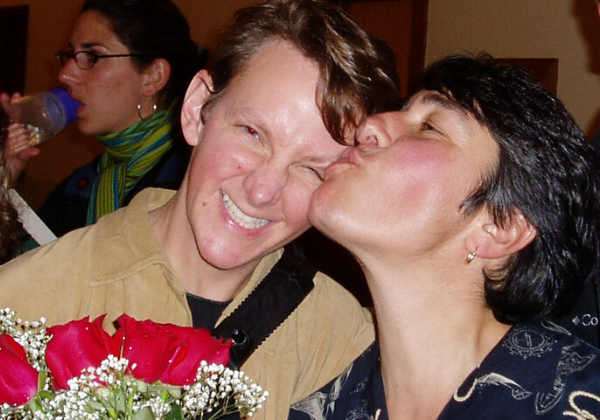
June 17 is my wedding anniversary. I imagine for most happily married people, the date of their wedding is fixed and associated with memories of a special celebration with friends and family. But for me, and many same-sex couples, my wedding day was more complicated than that. My wife and I have been together for twenty-four years. June 17, 2008 was actually our second wedding. The first was on February 13, 2004, when we, along with thousands of other same-sex couples, waited in line at San Francisco City Hall after then Mayor Gavin Newsom said we would be permitted to marry in the City and County of San Francisco. I went to City Hall that day with friends from work and my wife joined us in line. We drank champagne out of red plastic cups on the steps of City Hall.
Our marriage was later invalidated by the California Supreme Court. It was a painful day and it was upsetting to receive a letter from San Francisco, offering to refund our marriage license fees. The LGBTQ equality movement persisted and later won a ruling in California that same-sex couples were entitled to marriage equality. My wife and I remarried at City Hall on June 17, 2008, this time with more friends and family around to help commemorate our marriage. It was another tough day when the majority of California voters approved Proposition 8, enshrining a constitutional amendment against same-sex marriage.
Finally, in June 2015, we won marriage equality nationwide. We celebrated then, while recommitting ourselves to the civil rights battles yet to be won, including the right to hold employment free from discrimination based on sexual orientation and gender identity. Yesterday, in a 6-3 decisions, the Supreme Court finally recognized that right, holding in the Bostock cases that:
For an employer to discriminate against employees for being homosexual or transgender, the employer must intentionally discriminate against individual men and women in part because of sex. That has always been prohibited by Title VII’s plain terms—and that should be the end of the analysis.
While friends and colleagues celebrated, some in tears, I mostly felt a sense of relief that we had not received another blow to civil rights – the ones we brace for daily in the face of a global pandemic, the continuing struggle for racial and economic justice, and the very survival of democratic institutions.
As a civil rights lawyer who focuses on LGBTQ employment rights, I am delighted that the legal landscape for the LGBTQ community has become somewhat simpler – no more fraught decision points about pursuing claims with federal versus state agencies, no need to parse every word of a claim regarding sexual orientation or gender identity versus sex stereotyping and the like. However, the real problems of employment discrimination and harassment for the LGBTQ community, especially those who are low-wage workers, immigrants, and people of color will continue to require our focused time and attention as we celebrate the fact that at least now the courthouse door is open (perhaps only virtually in some states) to a community long excluded from equal access to those rights. Indeed, I spent most of the day of the Bostock decision working on a case for a transgender, immigrant farmworker who has been harassed due to her gender identity.
This pride month, while we celebrate Bostock our attention must also be on the continuing battles for equality left to be won and on lifting the voices of those who have been most excluded and marginalized in our community and the struggle for racial justice.
*Elizabeth Kristen is the director of Legal Aid at Work’s Gender Equity & LGBTQ Rights Program